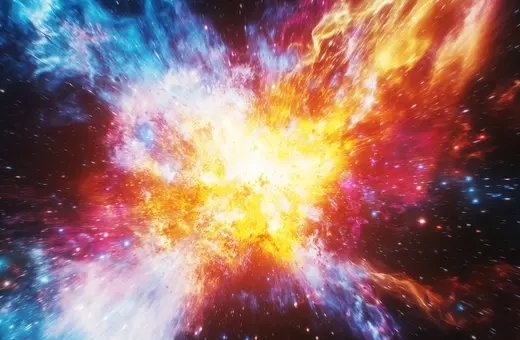The idea that the universe constantly splits into alternate realities has had a surprisingly warm reception in science, philosophy and popular literature. But this baroque solution to the unique problems of quantum mechanics is simply not good science. Not only should we resist its strange appeal, it’s time to find another way, writes Philip Ball.
Alternative realities hold an irresistible allure. Whether it’s Dickens’ A Christmas Carol, Frank Capra’s It’s a Wonderful Life, or the quantum-computed parallel universes of Alex Garland’s recent TV series Devs, the possible lives that we can imagine having led but did not lead offer a stage for acting out our fears and fantasies. Like Robert Frost’s traveller confronted with diverging paths in a wood, we often wonder where the road not taken might have borne us.
It is no surprise, then, that the Many Worlds interpretation (MWI) of quantum mechanics seems to hold such attraction. Even though most physicists dismiss or even deride it, it is often eagerly embraced by physics popularizers and their audiences. Yet it can be hard to figure out how seriously some of its advocates really take it. I believe some physicists genuinely see it as an elegant solution to deep conundrums of the notoriously mind-bending quantum theory, and I sympathize with some of their reasoning. But when they start talking about “quantum brothers” (and presumably sisters, though Many Worlds has curiously few female advocates), or using “quantum apps” to make difficult decisions by triggering some quantum measurement in the conviction that they are thereby splitting off a world where they made the other choice, I have to wonder whether, indifferent to the philosophical complications, they are just enjoying the fantasy.
I have to wonder whether, indifferent to the philosophical complications, physicists are just enjoying the fantasy of the Many Worlds interpretation.
Why, though, would anyone decide that the theory of quantum mechanics reveals an unimaginably vast, possibly infinite, series of other worlds constantly disentangling from our own? In his recent piece for IAI News, Daniel Nolan explains that the notion arises from the probabilistic nature of the theory. As German physicist Max Born (who is too rarely given due credit) argued in the 1920s, quantum mechanics seems to have a curious property unlike any other theory in science. It seems incapable, in general, of predicting what the observed outcome of a quantum event will be, but only the probabilities of all the possible outcomes. For a classical object like a tennis ball or a space rocket, Newton’s equations of motions can tell us exactly what path it will follow under a given set of circumstances. But fire a photon of light at two slit-like openings in a screen, and quantum mechanics can only offer probabilities of the road taken.
Only when we measure the outcome of a quantum event can we get a definitive answer. A 50:50 probability of outcomes A and B before the event, say, somehow turns into one or the other (a 100% certainty) when we look at the event once it has happened. It’s like flipping a coin: there’s a 50:50 chance of heads or tails before we flip, but once we’ve flipped and looked, it’s either 100% heads or 100% tails. Yet we can confirm that the initial 50:50 probability was right by repeating the experiment – making many tosses, whereupon we'll find that we get the same number of heads, on average, as tails.



















Join the conversation